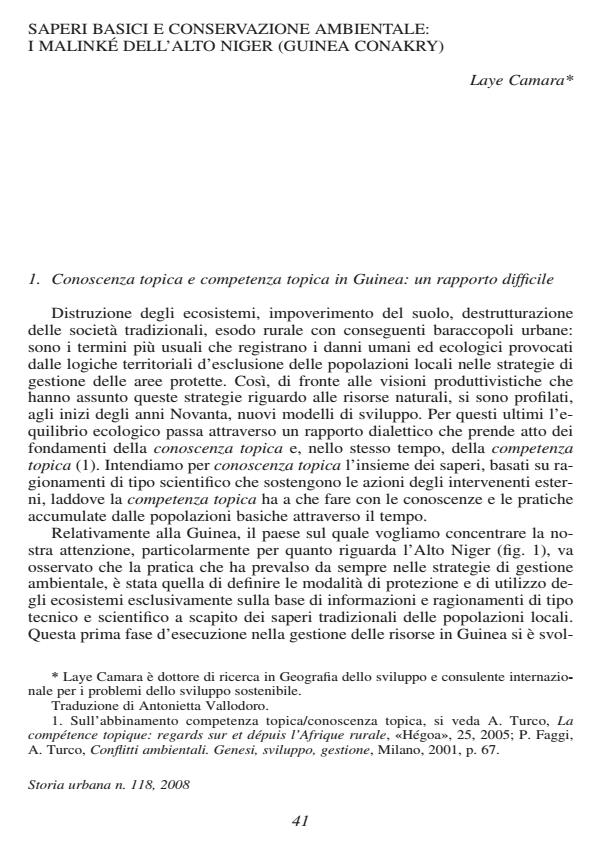Saperi basici e conservazione ambientale: i Malinkè dell'Alto Niger (Guinea Conakry)
Titolo Rivista STORIA URBANA
Autori/Curatori Laye Camara
Anno di pubblicazione 2008 Fascicolo 2008/118 Lingua Italiano
Numero pagine 27 P. 41-67 Dimensione file 1089 KB
DOI
Il DOI è il codice a barre della proprietà intellettuale: per saperne di più
clicca qui
Qui sotto puoi vedere in anteprima la prima pagina di questo articolo.
Se questo articolo ti interessa, lo puoi acquistare (e scaricare in formato pdf) seguendo le facili indicazioni per acquistare il download credit. Acquista Download Credits per scaricare questo Articolo in formato PDF

FrancoAngeli è membro della Publishers International Linking Association, Inc (PILA)associazione indipendente e non profit per facilitare (attraverso i servizi tecnologici implementati da CrossRef.org) l’accesso degli studiosi ai contenuti digitali nelle pubblicazioni professionali e scientifiche
Traditional knowledge and environmental conservation: Malinké of Upper Niger-Guinea Conakry - The exclusion of local populations from the management of the ecosystems is responsible for human and ecological damages such as the destruction of ecosystems, soil impoverishment, disarticulation of traditional societies, rural exodus, etc. A fundamental stage prior to the enactment of any policy of sustainable development and preservation of natural resources is to understand the relation of man with the environment through the analysis of men’s socio-cognitive representations of the external world. Unfortunately, until now, the programs for the preservation of natural resources in Africa have neglected this work of reconstruction and valorisation of traditional modalities of preservation of the environment, and have limited themselves to the techno-scientific or purely ideological and visionary rationales suggested by the agents of development or the administrators. The populations that live and inhabit the environment are excluded, de facto when not also de iure, from its management. This gap has opened the way, on a large scale, to claims, often conflicts, that regard the acknowledgement of the territorial legitimacy of the basic actors in the management of the protected areas. Through the example of the Malinké in the Upper Niger and the experience of the Pnhn(National Park of the Upper Niger) management, the paper highlights the importance of valorising traditional African knowledge in environmental management projects. The present study introduces the Malinké cognitive system by focusing the attention on the intellectual control process of the environment, which is considered the foundation of all practices of transformation and, at the same time, of protection of natural resources in the peripheral zones of the Pnhn. These practices are real traditional techniques of sustainable management of the natural resources of the village territories.;
Laye Camara, Saperi basici e conservazione ambientale: i Malinkè dell'Alto Niger (Guinea Conakry) in "STORIA URBANA " 118/2008, pp 41-67, DOI: